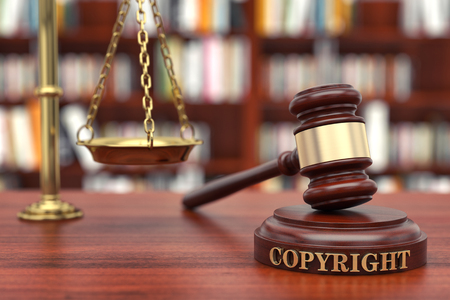 On Friday, October 19th, the U.S. Court of Appeals for the Eleventh Circuit issued a decision in Code Revision Commission v. Public.Resource.Org, Inc., which reversed-in-part, vacated-in-part and remanded a lower court’s ruling in a copyright infringement case involving an annotated version of Georgia’s official state code. Applying U.S. Supreme Court case law from the 19th Century, the last time the nation’s highest court decided issues relevant to this case, the Eleventh Circuit found that no valid copyright interest can be asserted in any part of the annotated state code.
On Friday, October 19th, the U.S. Court of Appeals for the Eleventh Circuit issued a decision in Code Revision Commission v. Public.Resource.Org, Inc., which reversed-in-part, vacated-in-part and remanded a lower court’s ruling in a copyright infringement case involving an annotated version of Georgia’s official state code. Applying U.S. Supreme Court case law from the 19th Century, the last time the nation’s highest court decided issues relevant to this case, the Eleventh Circuit found that no valid copyright interest can be asserted in any part of the annotated state code.
In July 2015, the Code Revision Commission, a body established by the Georgia General Assembly in 1977 to recodify Georgia’s state laws, filed suit in the Northern District of Georgia seeking injunctive relief to prevent Public.Resource.Org (PRO), a non-profit working to improve public access to government materials, from publishing all 186 volumes of the Official Code of Georgia Annotated (OCGA) online for free public access. PRO responded to the lawsuit by arguing that the state of Georgia didn’t hold an enforceable copyright to the OCGA. Although a LexisNexis Group subsidiary publishes the OCGA and is responsible for its ongoing maintenance, the publication agreement between LexisNexis and Georgia retains the copyright to the annotations in Georgia’s name. The Northern Georgia court entered a permanent injunction against PRO, finding that the annotations are not in the public domain because they lack the force of law.
On appeal, the Eleventh Circuit found that the heart of this case rests on the question of whether Georgia’s copyright in the OCGA is valid. Although the appellate court notes that “authorship” is central to the statutory scheme regarding copyright protection, the meaning of authorship takes on a special meaning in cases considering the copyrightability of a government edict. The Eleventh Circuit cited three Supreme Court cases regarding the issue, the last of which was decided in 1888. In Wheaton v. Peters (1834), the Supreme Court found that a reporter cannot hold a copyright in written opinions produced by the Court. The Supreme Court revisited the issue twice in 1888, first in Banks v. Manchester, a copyright infringement case where the Court found that decisions issued by the Supreme Court of Ohio are not copyrightable because a judge’s interpretation of the law is free for publication to all under public policy. Less than a month later, the Supreme Court decided Callaghan v. Myers where the Court found that a copyright claim asserted by a publisher of reports containing opinions issued by the Supreme Court of Illinois were valid because the publisher had obtained proprietary interest in the reports from an Illinois state official, although the rights did not extent to the decisions themselves.
The Eleventh Circuit also noted that Congress partially codified the rule from Banks into the 1909 Copyright Act, which provided that “no copyright shall subsist in the original text of any work which is in the public domain… or in any publication of the United States Government.” A 1961 Register’s Report released by the Copyright Office stated that Congress’ prohibition of copyright on federal government texts also extends to state government laws, judicial decisions and similar documents.
“The ultimate inquiry posed by the rule in Banks is thus whether a work is attributable to the constructive authorship of the People, which is to say whether it was created by an agent of the People in the direct exercise of sovereign authority,” the Eleventh Circuit opinion reads. An analysis of the OCGA led the appellate court to find that the annotations, while not having the force of law, are part and parcel of the law. First, the Eleventh Circuit found that the Georgia General Assembly was the driving force behind the annotations in the OCGA. Although the annotations were prepared by LexisNexis, those annotations were drafted based upon highly detailed instructions contained within its publishing agreement with the Code Revision Commission, making Georgia’s legislators the creators of the annotations.
Further, the annotations are authoritative sources on the meaning of Georgia statutes, heightening their legal significance. This makes the annotations closely analogous to a work representing an exercise of sovereign authority, which under U.S. public policy makes them a work of the people. The fact that the OCGA contains the word “Official” in its title further strengthens the significance of the document as not being simply one of many annotated versions of Georgia’s statutes.
Finally, the process used to create the annotations was closely related to the process used to create the statutes themselves, bringing the Eleventh Circuit to the conclusion that the OCGA is not copyrightable.

![[IPWatchdog Logo]](https://ipwatchdog.com/wp-content/themes/IPWatchdog%20-%202023/assets/images/temp/logo-small@2x.png)

![[Advertisement]](https://ipwatchdog.com/wp-content/uploads/2024/04/Patent-Litigation-Masters-2024-sidebar-700x500-1.jpg)

![[Advertisement]](https://ipwatchdog.com/wp-content/uploads/2021/12/WEBINAR-336-x-280-px.png)
![[Advertisement]](https://ipwatchdog.com/wp-content/uploads/2021/12/2021-Patent-Practice-on-Demand-recorded-Feb-2021-336-x-280.jpg)
![[Advertisement]](https://ipwatchdog.com/wp-content/uploads/2021/12/Ad-4-The-Invent-Patent-System™.png)






Join the Discussion
No comments yet.